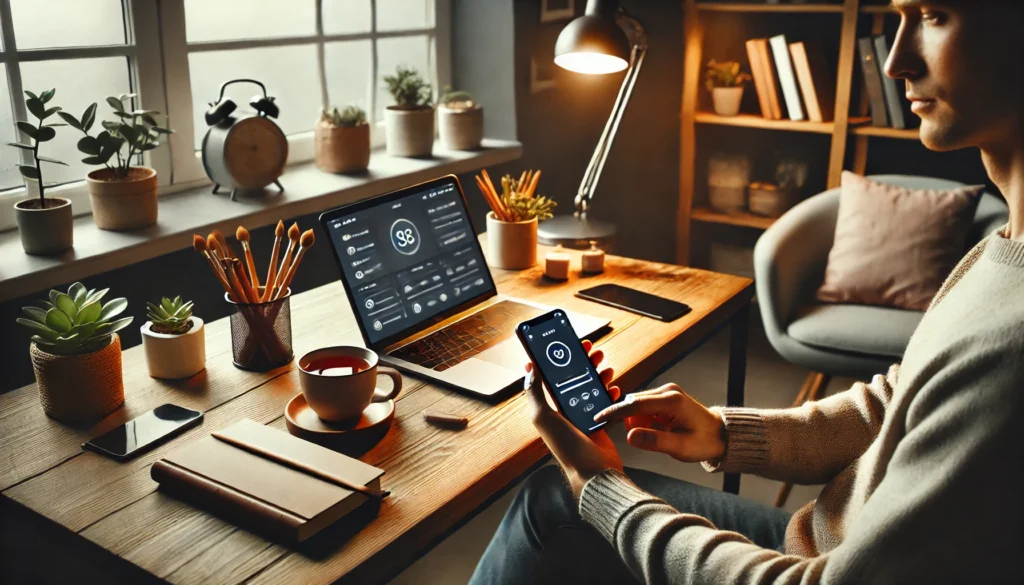Remote work offers flexibility but also comes with distractions and the potential for diminished focus. The lack of a structured environment can lead to procrastination, and the absence of physical interaction may cause feelings of isolation. Recognizing these challenges is the first step toward overcoming them.
You may also like: Overcoming Lack of Motivation at Work
Historical Context of Remote Work
Telecommuting is not a new phenomenon. Its roots can be traced back to the 1970s when Jack Nilles, a NASA engineer, coined the term. Initially, remote work was seen as an innovative solution to urban congestion and transportation issues. However, the COVID-19 pandemic accelerated its adoption, making it a widespread practice. This global shift has necessitated new approaches to maintaining productivity outside traditional office spaces. As remote work becomes more ingrained in our culture, understanding its evolution helps us appreciate the need for effective strategies.

Psychological Impact of Isolation
One of the most significant challenges of remote work is the feeling of isolation. Without the daily interactions with colleagues, employees can feel disconnected from their teams. This disconnection can lead to decreased motivation and lower productivity. Studies show that human interaction is vital for mental health, and the lack of it can result in stress and anxiety. Addressing these feelings through virtual meetups or team-building activities can help bridge the gap.
The Distraction Dilemma
Working from home introduces a myriad of distractions, from household chores to family responsibilities. Unlike a traditional office setting, the home environment is not exclusively designed for work. This dual-purpose space can make it challenging to maintain focus. Identifying personal distractions and developing strategies to minimize them is crucial. For instance, setting specific work hours and communicating them to household members can help create a more conducive work environment.
Strategies to Stay Focused
To tackle the challenges of remote work, consider these strategies:
Establish a Routine
Creating a daily schedule can provide structure. Begin your day with a morning ritual, whether it’s a workout, meditation, or a cup of coffee. Consistency in your routine helps signal to your brain that it’s time to transition into work mode. Furthermore, sticking to a set start and end time for your workday can help establish boundaries between work and personal life. This separation is essential to prevent burnout and maintain a healthy work-life balance.

Designate a Workspace
Having a dedicated workspace can significantly enhance focus. This space should be comfortable, ergonomically sound, and free from distractions. A clear separation between work and personal areas in your home can help maintain a professional mindset. Investing in quality office furniture, such as an ergonomic chair and desk, can improve posture and reduce physical strain, contributing to better productivity. Additionally, personalizing your workspace with motivational quotes or plants can create a more inviting atmosphere. For those working in noisy environments, investing in high-quality noise-canceling headsets can create a quieter, more focused workspace. The right headset can block out distractions and improve concentration during virtual meetings and deep work sessions.
Utilize Technology Wisely
Technology can be both a friend and a foe. Use apps like Trello or Asana to organize tasks and deadlines. Tools such as Focus@Will or Brain.fm provide music designed to improve concentration. However, be wary of digital distractions and establish boundaries for social media usage during work hours. Consider using website blockers or setting specific times for checking emails and messages to minimize interruptions. Optimizing your workflow with the right technology can significantly enhance efficiency and productivity. Implementing strategic productivity hacks can help streamline tasks, making remote work more manageable and effective.

Implement Time Management Techniques
Techniques like the Pomodoro Technique, which involves 25-minute focused work sessions followed by short breaks, can boost productivity. This method not only enhances focus but also allows for regular mental rest, preventing burnout. Experimenting with different time management strategies, such as time blocking or the Eisenhower Box, can help identify what works best for you. Regularly reviewing and adjusting your approach ensures continuous improvement and sustained motivation.
The Role of Physical and Mental Health
Maintaining motivation is closely tied to your physical and mental well-being.
Prioritize Physical Activity
Regular exercise boosts endorphins, which enhance mood and increase energy levels. Incorporating physical activity into your daily routine, even short walks or stretches, can improve concentration and motivation. Setting aside time for exercise, whether it’s a morning jog or an evening yoga session, can break the monotony of the day and rejuvenate your mind. Finding activities you enjoy ensures consistency and makes exercise a rewarding part of your routine.
Nutrition and Hydration
Proper nutrition fuels the brain. Opt for balanced meals with whole grains, lean proteins, and plenty of fruits and vegetables. Staying hydrated is equally important, as even mild dehydration can impair cognitive function and concentration. Planning meals ahead and keeping healthy snacks at your desk can prevent unhealthy eating habits. Moreover, tracking your water intake and setting reminders to drink water can keep your hydration levels in check, supporting overall cognitive performance.

Mindfulness and Stress Management
Practicing mindfulness through meditation or deep-breathing exercises can reduce stress and enhance focus. Apps like Headspace or Calm offer guided sessions that can fit into any schedule. Incorporating mindfulness practices into your daily routine can help manage stress and anxiety, promoting a calmer, more centered state of mind. Creating a quiet space for meditation or using aromatherapy can enhance the experience, making it easier to integrate mindfulness into your life.
Leveraging Biohacking Techniques
For those interested in optimizing their mental capabilities, biohacking provides intriguing possibilities.
Nootropics and Supplements
Nootropics, often referred to as “smart drugs,” are substances that may enhance cognitive function. While research is ongoing, some popular options include caffeine, L-theanine, and ginkgo biloba. Always consult a healthcare professional before adding supplements to your routine. Understanding the potential benefits and risks of nootropics is crucial for making informed decisions. Exploring natural alternatives like herbal teas or incorporating nutrient-rich foods into your diet can also support cognitive function.
Optimize Your Environment
Lighting, temperature, and air quality can impact productivity. Natural light and a comfortable room temperature enhance alertness, while air purifiers can improve air quality and cognitive performance. Adjusting your workspace lighting to mimic natural daylight can reduce eye strain and boost mood. Incorporating plants or using essential oils can create a pleasant atmosphere, promoting a sense of well-being and focus. Another crucial factor is minimizing auditory distractions, which can significantly impact productivity. Selecting the best headphones for focused work can help maintain a distraction-free workspace, allowing you to stay on task for longer periods.

Wearable Technology
Wearable technology, such as fitness trackers or smartwatches, can provide insights into your physical and mental well-being. These devices can track sleep patterns, physical activity, and even stress levels, offering valuable data to optimize your daily routine. Using wearable technology to monitor your health can help identify areas for improvement and encourage healthy habits. Regularly reviewing this data empowers you to make informed decisions about your lifestyle.
In addition to wearables, noise-canceling headsets designed for professionals can enhance focus and communication. Choosing the right headset can reduce background noise during calls and meetings, ensuring a seamless remote work experience.
Future Implications and Trends
The remote work landscape is evolving, with technological advancements shaping the future of work. Virtual reality (VR) and augmented reality (AR) may soon offer immersive work environments, and AI-driven productivity tools could further enhance efficiency.
Embracing Flexibility
Organizations are increasingly adopting hybrid work models, balancing remote and in-office work. This flexibility caters to diverse preferences and can lead to increased job satisfaction and productivity when managed effectively. Encouraging open communication and feedback within teams can ensure that hybrid models meet the needs of all employees. Providing resources and support for remote work can help employees thrive in this flexible environment.
Continuous Learning and Adaptation
The ability to adapt to new tools and workflows is crucial. Engaging in continuous learning through online courses or webinars can keep you updated with industry trends and innovations. Creating a culture of learning within organizations can encourage employees to embrace change and develop new skills. Offering opportunities for professional development and recognizing achievements can foster a motivated and forward-thinking workforce.

The Role of Artificial Intelligence
Artificial intelligence (AI) is becoming an integral part of the workplace, offering new possibilities for automation and efficiency. AI tools can streamline administrative tasks, allowing employees to focus on more strategic work. Understanding the potential of AI and its applications can help organizations leverage its benefits while addressing ethical considerations. Staying informed about AI advancements ensures readiness for the future of work.
Conclusion
Staying motivated while working from home requires a multifaceted approach. By establishing routines, leveraging technology, and prioritizing health, you can maintain focus and productivity. As remote work continues to evolve, embracing flexibility and continuous learning will be key to thriving in this environment.
Whether you’re a health and wellness coach, science journalist, or biohacker, these strategies can help you navigate the challenges of remote work, ensuring you remain motivated and focused. As we adapt to new work paradigms, maintaining motivation and fostering well-being will remain central to achieving success in any field.
Further Reading:
Working from home? These 25 tips will help you thrive
7 Work-From-Home Tips For a Calm and Focused Day
How To Stay Focused While Working From Home
Important Note: The information contained in this article is for general informational purposes only, and should not be construed as health or medical advice, nor is it intended to diagnose, prevent, treat, or cure any disease or health condition. Before embarking on any diet, fitness regimen, or program of nutritional supplementation, it is advisable to consult your healthcare professional in order to determine its safety and probable efficacy in terms of your individual state of health.
Regarding Nutritional Supplements Or Other Non-Prescription Health Products: If any nutritional supplements or other non-prescription health products are mentioned in the foregoing article, any claims or statements made about them have not been evaluated by the U.S. Food and Drug Administration, and such nutritional supplements or other health products are not intended to diagnose, treat, cure, or prevent any disease.


